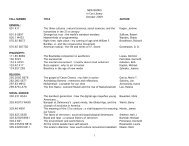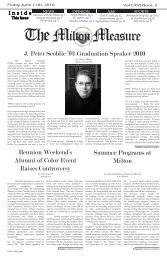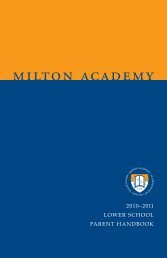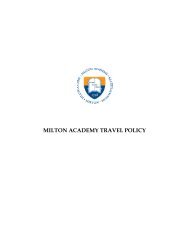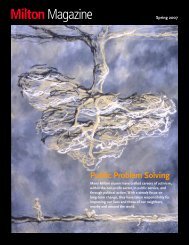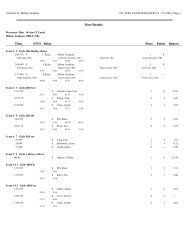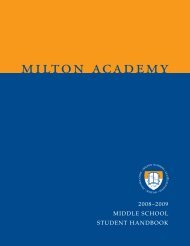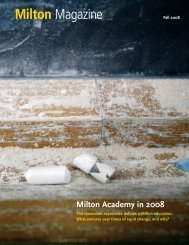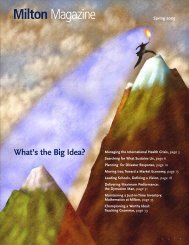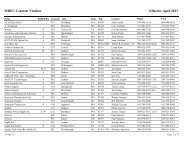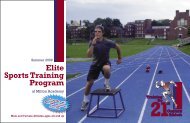Felicia Taylor ’82Ned Roberts ’93Caroline Cornish Kmack ’94“Glad you brought that up, Jim. The latest research on polls hasturned up some interesting variables. It turns out, for example,that people will tell you any old thing that pops into their heads.”Broadcast News: Where We Are NowIn the 21st century, the landscape ofbroadcast journalism includes not onlylocal and network news, but also cablechannels and related Web sites. The reachexpands even as the ownership of outletscontracts. The 24-hour cycle of today’snews drives the new engines: time andspace must be filled. Viewers can watchthe video clips online—the same clipsendlessly, if they desire. Entertainmentnews and hard news blur. Speechwriterscraft messages mindful of the potential forsoundbites to resonate indefinitely.According to a June <strong>2005</strong> Pew ResearchCenter Survey report, most Americans saythat they like mainstream news outlets. Bywide margins, more Americans give favorablethan unfavorable ratings to their dailynewspaper (80%–20%), local TV news(79%–21%), and cable TV news networks(79%–21%), among those able to ratethese organizations. The margin is onlyslightly smaller for network TV news(75%–25%).In fact, the favorable ratings for mostcategories of news organizations surpasspositive ratings for President Bush andmajor political institutions such as theSupreme Court, Congress and the twomajor political parties.<strong>Milton</strong> graduates are among those whocapture and broadcast the nation’s news.They believe strongly in the power andimportance of their work to helpAmericans acquire the information theyneed to lead productive lives.Name: Felicia Taylor ’82Station: Co-anchor, NBC 4,New York“If my stories can inform, shape your dayor somehow help people, I’m satisfied. Ifwatching a story [about a financial issue orproduct] gives you a leg up and makes anopportunity available to you, then I’vedone my job.“At the end of the day, I love what I do,”Felicia says, “There’s no such thing as atypical day.”Felicia looks at delivering news as a way toserve the community; capturing those storiesoften requires assertiveness.“If you’re talking to the media, make sureyou know what you want to say,” she says,“then say only what you intend.”Felicia doesn’t make apologies for goingafter her story. To her, it’s a job and aprofession in which luck and perseverancehelped her succeed: to capture the storyand, now, to share it from the anchor’sdesk.“Yesterday [July 27], I watched the shuttlelaunch and it brought back to me the daywhen I was at WLS in Chicago [as anintern], the day of the shuttle Challengerdisaster. I remember sitting in the newsroom,watching this thing go up and justthinking that something didn’t look right,”she says. “It was my first taste of breakingnews. I remember feeling fear, uncertaintyand adrenalin. I remember thinking,‘What is the story? What do we need to tellpeople?’ And that was before the Internet;we didn’t have the same resources.”In Felicia’s early news experience, she witnesseddisaster—she later reported on9/11 and the first Gulf War, too—but businessand financial news reporting haveshaped much of her career. Felicia startedat the Financial News Network (FNN), acable station, in New York before cablewas relevant and before business newshad emerged as “the next big thing.”Felicia had always thought of herself as aproducer. Her first airtime came when theanchor seat of “This Morning’s Business”became vacant, and the program’s managingeditor suggested that Felicia might sitin. The show’s general manager thoughthis girlfriend might do as well in theseat—but an independent analyst of theaudition tapes chose Felicia. There, in thebasement of New York’s old Exxon building,the producer became an anchor.14 <strong>Milton</strong> Magazine
The first person she interviewed was LarryKudlow, a business legend. “I hadn’t studiedbusiness and barely knew the differencebetween a stock and a bond,” Feliciasays. “Larry gave me my reading list,which included the Wall Street Journal andCharles Mackay’s Extraordinary PopularDelusions and the Madness of Crowds”—a tome that introduced Felicia to the conceptof bubbles, among other financialphenomena (the tulip bubble in Hollandin the 1600s—when tulips traded at ahigher price than gold—was one of the1841 book’s case studies).Felicia hit her first bump when CNBCbought FNN and the supply-demand balanceleft Felicia without a job. She movedto London, signed on for a few classes atSotheby’s and made a list of just aboutevery producer in London. Before she’dexhausted her list, a friend’s husbandmentioned that the Financial Timesplanned a new business show, and Feliciagot her break in London. She joinedCNBC in 1992 as London correspondentfrom the Financial Times, where sheanchored three business shows seen onSky Television and Superchannel.Since 2003, Felicia has been co-anchor ofNewsChannel 4. Prior to that, she was theco-anchor for NewsChannel 4’s “WeekendToday in New York,” the station’s top-ratedweekend morning news programs. Shejoined News Channel 4 in October 1998from CNBC, where she was co-anchor of“Today’s Business” and “Market Watch.”While at CNBC, Felicia also served as acontributor to the weekday editions of“Today” in New York, providing daily businessand stock market updates. She alsohas contributed reports to NBC “News atSunrise.”One of Felicia's most important tenets inpreparing and delivering the news is this:“If I give my word to somebody, I stand byit,” she says. “ [But] the news is neverabout me. The news is the news: a bombingin Egypt, an explosion in an apartmentbuilding in Queens. I like to tell storiesthat affect a great number of people; I liketo tell them as much as I can.”Over a year ago, Felicia broke a story about”naked shorts”—a stock is sold short withoutany ability or intention to ever coverthe sale, a crime according to the SEC regulations,but a crime that has not regularlybeen punished. That story has since heldserver space on financial Internet sites andblogs, and in publications such as the WallStreet Journal.Felicia claims that her only formal trainingfor becoming a broadcast journalist camefrom Dale Deletis, former <strong>Milton</strong> SpeechTeam coach. “The gift of being able towrite well has also been very important.A news story should be simple to digest,”she says.Felicia applied to <strong>Milton</strong> late and enjoyedthe unusual experience of living as amember of the Pieh household with formerHeadmaster Jerry Pieh and his family.“I spent two great years there withthem and their slobbering dog,” shelaughs.Felicia has been nominated for an Emmyfive times.Name: Ned Roberts ’93Station: Reporter, WTSP-TV News,Tampa, FloridaNed believes that the best television newspieces let the characters tell the story. “Thepower is hearing directly from the source.In a well-done piece, you use everythingyou have. TV is a visual medium, so itpays to maximize what you get on tape.”Ned has been telling the stories well, asevidenced by an Emmy—one of two—hewon in 2004 for writing “Homecoming”about a soldier’s return from Afghanistan.“In local news, I think that writing is animportant piece that often gets overlooked,”he says.Finding a compelling story is anothermust-have, like Ned’s story about AmosKing, an inmate of the Florida prisonsystem who was scheduled to be put todeath until Governor Jeb Bush granted atemporary stay after Ned contacted theInnocence Project, a nonprofit legal clinicthat handles cases where postconvictionDNA testing of evidence can yield conclusiveproof of innocence. “I asked if theywere looking at the case,” Ned recalls. Heexplained the lack of conclusive physicalevidence against King in stories thattraced King’s plight. In the end, mostphysical evidence had been lost ordestroyed, and Ned witnessed King’s executionon February 27, 2003, but Nedmaintains that it was right to pursue thestory and bring the issue of DNA evidencein old criminal trials to people’s consciousness.“The real power of local news is tospur government and community action,”Ned says.Ned’s continuing coverage of Death Rowinmate King earned him an Edward R.Murrow Award in 2003. Also that year, hewon an Emmy Award for his live reportfrom a hurricane simulator. In 2002, hisreport on the U.S. Coast Guard tall shipEagle earned him an Emmy Award nomination.When Ned pursues an assignmentor an idea, he’s “thinking about what storyI can tell and whether it’s something that Imight want to know about.Felicia Taylor ’82 Ned Roberts ’93 with Michelle Jordan (see page 78)15 <strong>Milton</strong> Magazine
- Page 3 and 4: 283440Journalism at Milton24 Studen
- Page 6 and 7: One piece of AOL programming that h
- Page 8 and 9: puter) and read a piece. Bored? Pro
- Page 10 and 11: decrease in the amount spent on res
- Page 12 and 13: “The biggest change is corporatei
- Page 14 and 15: Jesse Sarles ’93“It’s a flexi
- Page 18: “I don’t go through a lot of me
- Page 21 and 22: This summer, Peter was in the midst
- Page 23 and 24: Ty Burr ’76“On one level what I
- Page 25 and 26: Later, she enjoyed stints at Workin
- Page 27 and 28: were what to get into at Milton. Ma
- Page 29 and 30: Charlie Riggs, Abby Padien-Havens,
- Page 31 and 32: They say that the tough part was th
- Page 33 and 34: Co-editors of La Voz, 2005:Emma San
- Page 35 and 36: In its three to four annual issues,
- Page 37 and 38: 6 Sam Minkoff ’06 andJamal Sabky
- Page 39 and 40: Student graduation speakers Tanner
- Page 41 and 42: The Robert L. Daley PrizeCreated by
- Page 43 and 44: 1 Llewellyn Howland ’552 Derick F
- Page 45 and 46: 11 Robin Robertson with the MiltonM
- Page 47 and 48: The Head of SchoolMilton’s Magazi
- Page 49 and 50: I began to inventory the sensations
- Page 51 and 52: Hadley Davis Rierson ’89speaking
- Page 53 and 54: Emmy Norris is a prowler for “cul
- Page 55 and 56: A collection of symbols, none more
- Page 57 and 58: Middle School Tackles Complex Probl
- Page 59 and 60: Gratwick Performersdents prior to t
- Page 61 and 62: He changed his mind, though,soon mo
- Page 63 and 64: Creating Cityscapes:Third-grade stu
- Page 65 and 66: New Roles for Milton Faculty Member
- Page 67 and 68:
Hugh R. SilbaughUpper School Princi
- Page 69 and 70:
Academy. Jorge was singularlyfocuse
- Page 71 and 72:
There are many variations foreach s
- Page 73 and 74:
Class of 1950, front row (left to r
- Page 75 and 76:
Class of 1955, front row (left to r
- Page 77 and 78:
Class of 1980, holding banner (left
- Page 79 and 80:
Class of 1990, front row (left to r
- Page 81 and 82:
Class of 1995, front row (left to r
- Page 83 and 84:
Margaret Creighton WilliamsMargaret
- Page 85 and 86:
The Lexi Rudnitsky Poetry Projectsp
- Page 87 and 88:
Milton AcademyBoard of Trustees, 20



